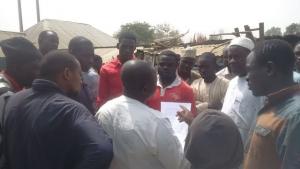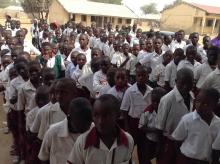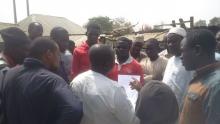Journalists join fight against Lassa fever in security compromised North eastern Nigeria
Abuja, 02 February, 2016 - As part of ongoing efforts to contain the spread of Lassa fever, the World Health Organization (WHO) in collaboration with the Journalists’ Initiative Against Polio (JAP), has taken the campaign on personal and environmental hygiene to both urban and rural communities in the North East Zone (NEZ) with emphasis on infected states of Bauchi, Gombe and Taraba.
Cumulatively in the country, 166 suspected cases (68 laboratory confirmed) and 99 deaths (43 in confirmed cases) with Case Fatality Rate (CFR) of 59.6%) have been reported from 18 states plus the Federal Capital Territory as at 01 February, 2016. In the Northeast zone, a total of 13 confirmed cases and 8 deaths in confirmed cases with CFR of 61.5% have been reported from Bauchi, Gombe and Taraba. The three states have had, ongoing transmission of the Lassa fever disease since November 2015.
Even though the trend of transmission appears to be dropping, the Lassa fever was first discovered in Lassa village, Borno state, north eastern Nigeria in 1969. The disease is therefore endemic in that part of the country with outbreaks recorded every year over the last five years. In order to mitigate the continuing spread of the disease within the zone, the JAP members were sensitized and engaged.
The sensitization, which held in the conference halls of 10 media houses, focused principally on key messages on Lassa fever, the roles and responsibilities of journalists in raising public awareness to prevent epidemics and constructive reporting.
WHO facilitated the formation of JAP in 2007 and the partnership has assisted in creating consciousness among fellow journalists and bringing to the fore, their social responsibility in increasing population immunity against vaccine preventable diseases and promoting routine immunization and community disease surveillance.
While describing the coordinated sensitization of the JAP in the NEZ as a step in strengthening WHO’s partnership with the media, Dr Abdelrahim Khalid, the Zonal Coordinator stated that “WHO will not relent in its effort to build strong partnership with stakeholders in strengthening preventive measures and enhancing community surveillance against all epidemic prone diseases in the zone”.
In Bauchi state for instance, members of the JAP organized and conducted series of other community sensitization activities as part of their contribution to the ongoing efforts to combat the disease. The JAP embarked on sensitization and awareness creation campaign on Lassa fever in the five high risk local government areas (LGAS) of the state and sensitized the communities on dangers, prevention and control measures of the disease.
During the sensitization visits to secondary schools and market places in the state, they distributed copies of key messages on Lassa fever in English and local languages to students and other community members. The team rounded-off their sensitization drive in each of the high risk LGAs with 60 minutes phone-in programme on the community radio stations.
In a related effort to reinforce the process of community empowerment with key information on precautionary measures, the WHO also deployed over 10,000 house-to-house personnel in the zone to support the efforts of the JAP while at the same time carrying out community surveillance on Lassa fever and other epidemic prone diseases during the January round of the polio vaccination campaign conducted from 23-26 January, 2016.
Preparatory to the engagement of the personnel for community sensitization and surveillance activities, the LGA and ward levels training opportunities were maximally utilized. Both the ward focal persons and the house-to-house teams were sensitized on the cause and prevention of Lassa fever. Copies of key messages and FAQs on Lassa fever were re-produced in local languages and distributed by the vaccination teams.
While no case was reported during the campaign, the delivery of the key information on the disease has, nonetheless, assisted to increase the sensitivity of the index of suspicion. According to Dr Mahmud Saidu the WHO State Coordinator Borno State, “there is no better time to conduct community sensitization and surveillance than during the campaigns when our teams are visiting all communities and every household”.
WHO will continue to partner with government and stakeholders at all levels to provide technical support in the coordination of containment activities of the Lassa fever epidemic.
_________________________________________
For more information please contact:
Technical contacts:
Dr Mary Stephen: +234 816 289 9789; Email: stephenm [at] who.int (stephenm[at]who[dot]int)
Dr Abdelrahim Khalid; +234 803 402 1284; Email: abdelrahimk [at] who.int (abdelrahimk[at]who[dot]int)
Media contacts:
Ms Charity Warigon; Tel: +234 810 221 0093; Email: warigonc [at] who.int (warigonc[at]who[dot]int)
Dr Mustapha Umar; Tel: +234 803 616 9972: Email: umarm [at] who.int (umarm[at]who[dot]int)
_________________________________________
Below:
01. JAP members sensitizing traders in Bauchi Central Market, Bauchi State
02. School children assembled for sensitization by JAP on Lassa Fever in Toro LGA, Bauch State





